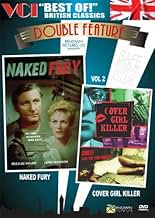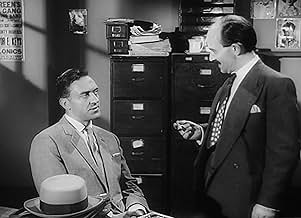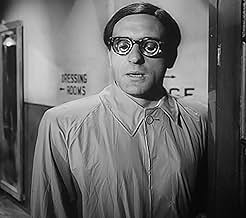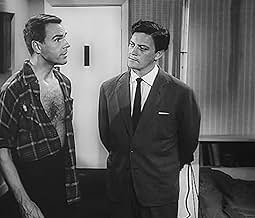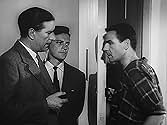Set in the sleazy world of a backstreet 1950s nightclub, a serial killer is believed to be murdering the models of a glamour magazine.Set in the sleazy world of a backstreet 1950s nightclub, a serial killer is believed to be murdering the models of a glamour magazine.Set in the sleazy world of a backstreet 1950s nightclub, a serial killer is believed to be murdering the models of a glamour magazine.
Frank Barringer
- Detective
- (uncredited)
- Director
- Writer
- All cast & crew
- Production, box office & more at IMDbPro
Featured reviews
There are some surprisingly long well-informed reviews of this seemingly rather undistinguished 1959 British B. Those who might have seen it at that time are now all senior citizens. But for a few, perhaps a very few, such elderly gentlemen it evokes memories of their formative years like nothing else.
If you had been a young person with an interest in photography you would have been aware of the publications safely tucked away on the top shelves of the newsagents shops - as appear in this film. Soho was then as now an exotic location well known for the fleshly pleasures including foreign foods. Indeed it was a basket of exotica quite unique in the entire UK. Oddly at the same time, it was the home of army surplus radio gear - all displayed on stalls outside the shops. It thus drew serious studious radio amateurs old and young to briefly share its busy notorious pavements with its more permanent and mostly female residents as well as passing rather furtive older gentlemen in raincoats and often bowler hats whose visit might only be slightly longer than that of the innocent old and young radio enthusiasts.
By the standards on the 1950s, the above would be quite unsuitable for any kind of family publication or family conversation as it alludes to what was common knowledge but then a taboo topic in family contexts. Such were the dim and distant 1950s - made vivid again by this film whose makers clearly knew their market.
Did I see it at the time? I'm not sure - it would have been at least an A possibly an X certificate. Yet Felicity Young seems oddly very familiar. Why was she so memorable? Not just because she was very good looking. I think because she was a classy ostensibly "nice" girl who did - remove her clothes, not all of course. In a world then firmly divided between nice girls who didn't and not nice girls who did, Felicity Young produced a thrilling confusion in a younger impressionable mind - apparently.
It is a strange thing that less can be more. In such restricted times, very little could seem very much more.
If you had been a young person with an interest in photography you would have been aware of the publications safely tucked away on the top shelves of the newsagents shops - as appear in this film. Soho was then as now an exotic location well known for the fleshly pleasures including foreign foods. Indeed it was a basket of exotica quite unique in the entire UK. Oddly at the same time, it was the home of army surplus radio gear - all displayed on stalls outside the shops. It thus drew serious studious radio amateurs old and young to briefly share its busy notorious pavements with its more permanent and mostly female residents as well as passing rather furtive older gentlemen in raincoats and often bowler hats whose visit might only be slightly longer than that of the innocent old and young radio enthusiasts.
By the standards on the 1950s, the above would be quite unsuitable for any kind of family publication or family conversation as it alludes to what was common knowledge but then a taboo topic in family contexts. Such were the dim and distant 1950s - made vivid again by this film whose makers clearly knew their market.
Did I see it at the time? I'm not sure - it would have been at least an A possibly an X certificate. Yet Felicity Young seems oddly very familiar. Why was she so memorable? Not just because she was very good looking. I think because she was a classy ostensibly "nice" girl who did - remove her clothes, not all of course. In a world then firmly divided between nice girls who didn't and not nice girls who did, Felicity Young produced a thrilling confusion in a younger impressionable mind - apparently.
It is a strange thing that less can be more. In such restricted times, very little could seem very much more.
A wonderful gem of sleazy 1960s London with a brilliant performance from the wonderfully versatile Harry H Corbett in a very dark interesting turn as a Serial killer
Despite only lasting an hour, this film about a serial killer who has a grudge against cover girls - a la The Lodger and Jack the Ripper - rarely flags and has an energy which lifts it above other B movies of the time. It also has Harry H Corbett, best known these days for Steptoe and Son, proving he could act in a serious role. He is genuinely creepy, chilling and calculating.
In some respects this film also reminds me of Peeping Tom, also about a psychopathic murderer of high intelligence who kills by ritual. While that film was a straight A, 'Cover Girl Killer' does not pale in its company, and it proves its worth as a late night regular on TV.
In some respects this film also reminds me of Peeping Tom, also about a psychopathic murderer of high intelligence who kills by ritual. While that film was a straight A, 'Cover Girl Killer' does not pale in its company, and it proves its worth as a late night regular on TV.
This movie for me is very much a sweet and sour affair. One the one hand I think Steptoe and Son is the finest comedy ever but also I think if it would never have happened we could and should have seen Harry H Corbett as one of Britains finest actors. This gem of a movie takes all the naivety of days gone by with the age old story of a bad man who thinks the world is changing for the worse and depravity rules. Blitzed into just 60 odd minutes this was obviously made as a B movie but is a world above anything it was made to run alongside. If this was remade today it would have to be a gruesome 18 cert affair probably filmed in the seedy parts of London and involve drugs and prostitutes ( Harry Brown springs to mind)but the way they get the message across without so much as a grain of smut is incredible. Absolutely fantastic piece of movie making and seems as relative today as it was when made over 50 years ago.
A weirdo approaches the stage door of the Casbah Club, in 1950s Soho, and is transfixed by a portrait of Miss Gloria Starke (Bernadette Milnes, who pops up in the opening scene of Cover Story, a Sweeney episode, fifteen years later - if you're interested, like).
This is a film by Butchers Film Distributors (at least, I think it is IMDb lists it as Jack Parsons Productions) and it's a film on a different level, theme wise, to almost every other second feature of its era. Cover Girl Killer is a film about a voyeur (in this most voyeuristic art form) who becomes a serial killer in order to "give man back his dignity, to free him from the prison of lustful images which foul his mind and pollute his sanity." The killer, played by Harry H Corbett, and billed only as The Man, feels imprisoned by society's values (which he finds morally abhorrent) and can only become "free" by killing girls who take off their clothes for Wow! Magazine. "I assure you, miss, your nudity means nothing to me", says Corbett, before dispatching one of them, Christina Gregg, who often popped up as the vulnerable type.
I've always had a problem with Corbett in a straight roll (Harry not Ronnie); his acting is just ludicrously mannered really bad, oo I can act, look at me, amateur dramatics. Here, fortuitously, he's playing such an oddball that he's actually quite effective. Of course, the killer doesn't think he's doing anything wrong. "The borderline between what we call insanity and a hyper sensitive intellect is not always very clear, inspector", he tells Inspector Brunner (Victor Brooks), after turning up in his office, pretending to be Mr. Fairchild, property developer. Why he does this is not clear. Maybe, it's an ego thing and he wants to pit his wits against the police.
The most interesting scene is when the killer approaches Lennie Ross, (Theatre, Screen and TV agent, 3rd floor), for an actor to play the killer in the cover girl case. "Surely sex and horror are the new gods in this polluted world of so called entertainment?" (This line later featured in a UK number 1 smash for Frankie Goes To Hollywood, pop pickers.) Here, Cover Girl Killer really gets to the heart of the matter; reflecting on itself as we watch plans for a film version of the film we are actually watching.
This is a film by Butchers Film Distributors (at least, I think it is IMDb lists it as Jack Parsons Productions) and it's a film on a different level, theme wise, to almost every other second feature of its era. Cover Girl Killer is a film about a voyeur (in this most voyeuristic art form) who becomes a serial killer in order to "give man back his dignity, to free him from the prison of lustful images which foul his mind and pollute his sanity." The killer, played by Harry H Corbett, and billed only as The Man, feels imprisoned by society's values (which he finds morally abhorrent) and can only become "free" by killing girls who take off their clothes for Wow! Magazine. "I assure you, miss, your nudity means nothing to me", says Corbett, before dispatching one of them, Christina Gregg, who often popped up as the vulnerable type.
I've always had a problem with Corbett in a straight roll (Harry not Ronnie); his acting is just ludicrously mannered really bad, oo I can act, look at me, amateur dramatics. Here, fortuitously, he's playing such an oddball that he's actually quite effective. Of course, the killer doesn't think he's doing anything wrong. "The borderline between what we call insanity and a hyper sensitive intellect is not always very clear, inspector", he tells Inspector Brunner (Victor Brooks), after turning up in his office, pretending to be Mr. Fairchild, property developer. Why he does this is not clear. Maybe, it's an ego thing and he wants to pit his wits against the police.
The most interesting scene is when the killer approaches Lennie Ross, (Theatre, Screen and TV agent, 3rd floor), for an actor to play the killer in the cover girl case. "Surely sex and horror are the new gods in this polluted world of so called entertainment?" (This line later featured in a UK number 1 smash for Frankie Goes To Hollywood, pop pickers.) Here, Cover Girl Killer really gets to the heart of the matter; reflecting on itself as we watch plans for a film version of the film we are actually watching.
Did you know
- TriviaIn 1984, the band Frankie Goes to Hollywood paraphrased one of The Man's lines "Are we living in a land, where sex and horror are the new Gods?" for their song "Two Tribes".
- GoofsSpencer Teakle manages to arrive at the stage door of the theatre where Felicity Young is being held captive after having left the police station just seconds before.
- Quotes
[Gloria is informed that she'll need to work all night and into the next morning]
Gloria Starke: Ten o'clock? I shall be dead!
[smash cut to her lying dead on the ground]
- ConnectionsFeatured in Truly, Madly, Cheaply!: British B Movies (2008)
Details
- Runtime
- 1h 1m(61 min)
- Color
- Aspect ratio
- 1.37 : 1
Contribute to this page
Suggest an edit or add missing content

